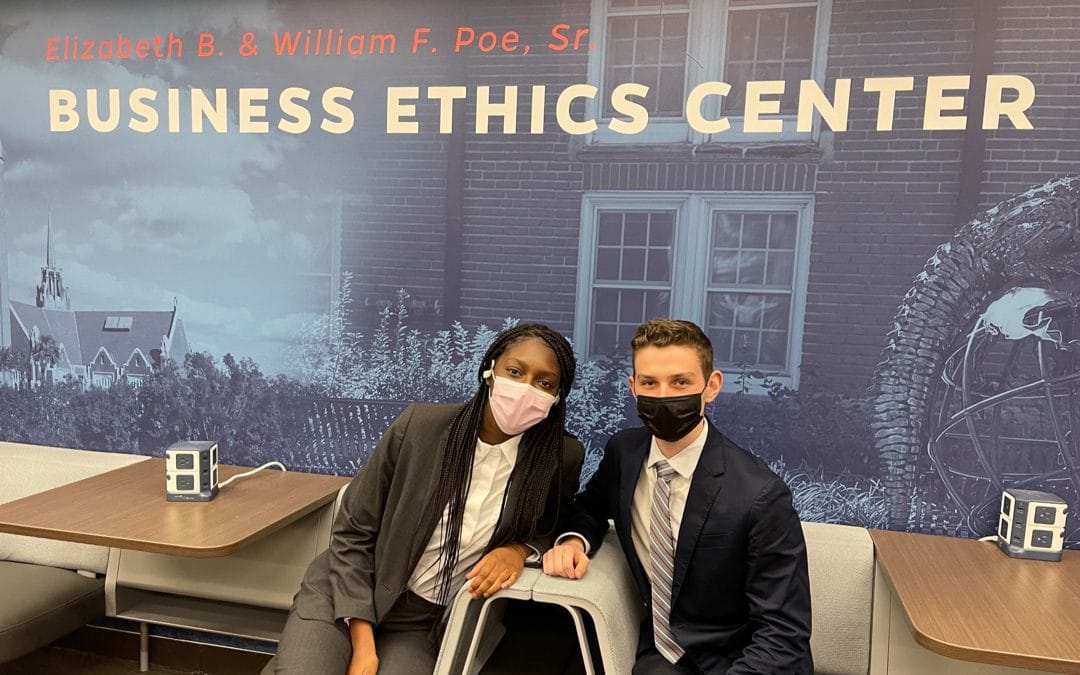Warrington team among the top three at ethics case competition
GAINESVILLE, Fla. – Two students from the University of Florida Warrington College of Business finished among the top teams at the Templeton Business Ethics Case Competition at Stetson University. The team finished third in the final ethics case competition.
“The Templeton Business Ethics Case Competition provides students with an opportunity to sharpen their analytical and critical thinking as well as their presentations skills,” said Dr. Brian Ray, Director of the Poe Business Ethics Center. “This competition always attracts teams from some of the best colleges and universities from around the world. Teams competing this year included the U.S. Naval Academy, Georgetown, Penn State, Boston College, UMass Amherst, the University of Calgary, Iowa State, Clemson and Universidad Panamericana.
“The business ethics case for this particular competition centered on whether a company can or should mandate that its employees receive the COVID vaccine. This scenario presents a variety of interesting ethical challenges. It was extremely rewarding to see all of the talented undergraduates who participated in this competition focused on a timely issue of such significance consequence.”
The Templeton Business Ethics Case Competition is for undergraduate students from invited institutions. Students were asked to construct a PowerPoint presentation and gathered virtually to present the case to a distinguished panel of judges.
Kitan Adeniji (BSBA ’22, MIB ’23) and Zach Kashman (BSBA ’23) represented Warrington at the case competition. As part of the case, Adeniji and Kashman were asked to serve as hypothetical consultants for Darden Restaurants. They were tasked with analyzing the issues Darden faced in weighing the safety of their customers and staff around COVID-19, and specifically, make recommendations regarding the company’s stance on vaccinating their employees.
In their 20-minute presentation, Adeniji and Kashman recommended that Darden pursue a vaccination program for their employees. The team called their strategic plan, “Always Cautious, Always Considerate.”
“COVID-19 is a public health crisis and any employee who could potentially spread COVID-19 is a direct threat to the workplace,” Adeniji and Kashman wrote in their executive summary. “As vaccine rollouts have begun and are set to become widely available for essential workers, we recommend that Darden implements a program using an informative transitional process. Beginning with educating employees, followed by enforcement of the vaccine for all Darden workers within six months of eligibility (absent exceptions), Darden will approach the uncertainty of the pandemic altruistically.”
Overall, the team’s plan addressed the financial, legal and ethical questions the company faced. With an investment of $42 million, Adeniji and Kashman said their plan balanced utilitarianism and proportionalism and kept key legal implications associated with vaccine exceptions and mandates in mind.
“It felt very rewarding to win the case competition after the hard work and time we spent coming up with our answer to the dilemma and perfecting our presentation,” Adeniji said. “Templeton was Zach and I’s first ethics competition of this caliber, so coming in third place was so exciting.”
Dr. Ray added, “Zach and Kitan’s hard work definitely paid off at this year’s Templeton Business Ethics Case Competition. Placing in the ‘Top 3’ of this rigorous and prestigious event should be a tremendous source of pride for the Gator Nation. It is wonderful to see that the Poe Business Ethics Center continues to make a big impact on the professional development of our undergraduate students. GO GATORS…GO ETHICS!”




